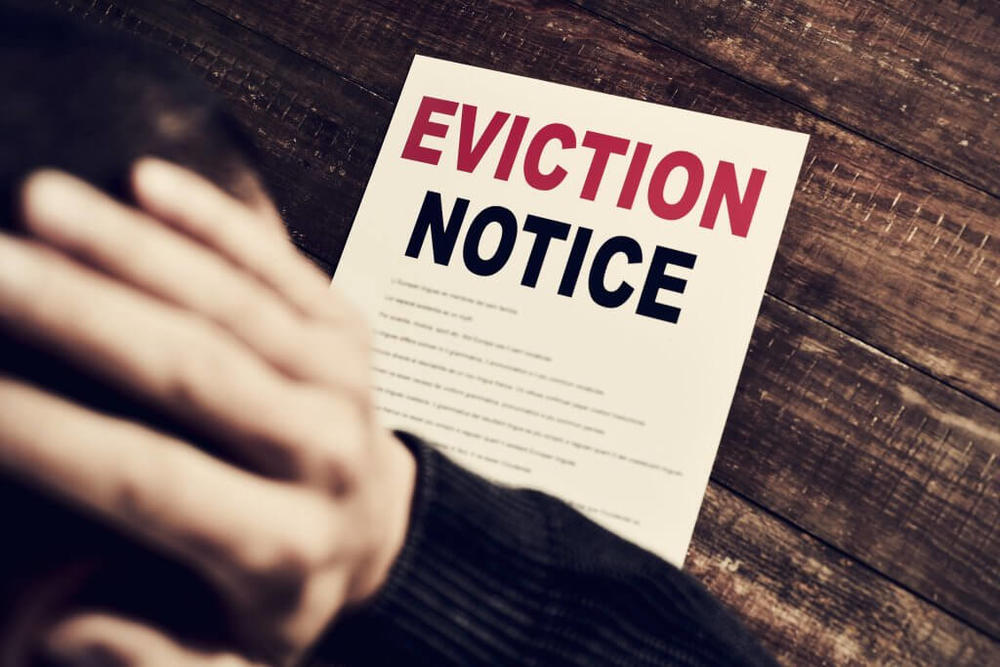
Caption
A DeKalb County judge extended an eviction moratorium in the county of 760,000 after President Joe Biden and Congress let the federal ban on displacing delinquent renters expire.
Credit: Stock image/Georgia Recorder

A DeKalb County judge extended an eviction moratorium in the county of 760,000 after President Joe Biden and Congress let the federal ban on displacing delinquent renters expire.
A DeKalb County judge stepped into a looming eviction crisis in Georgia after President Joe Biden couldn’t extend a moratorium on displacing delinquent renters and Congress didn’t come to the rescue.
DeKalb Superior Court Judge Asha Jackson Friday signed off on the 60-day extension in the county of 760,000 people. It provides similar protections for tenants who’ve fallen behind on their rent as did the Centers for Disease Control and Prevention’s moratorium that ran from September through the end of July.
DeKalb CEO Michael Thurmond said he will also recommend that when county commissioners meet Tuesday they increase the cap for the county’s emergency rental assistance program that uses federal funding to aid renters and property owners.
Across much of Georgia, as more eviction cases advance through the courts, the pressure is growing to speed up distribution of hundreds of millions of federal dollars for rental assistance to tenants and their landlords before it’s too late.

DeKalb Superior Court Judge Asha Jackson
While the pandemic relief bills passed by Congress have included $46 billion in emergency rental assistance, that money has trickled out slowly from state and local governments as those agencies scrambled to administer new programs or bolster ones that had been historically underfunded.
Georgia and its largest local governments are now distributing $710 million in the first stage of a $1.2 billion federal assistance program intended to help people pay rent and utility bills.
On Friday, President Joe Biden implored state and local governments “to take all possible steps to immediately disburse” the money.
Nationally, the U.S. Treasury Department reports the distribution rate is about 12% for the first phase of rent assistance.
Since opening its program in March, Georgia’s Department of Community Affairs has provided 4,715 applicants with $15.3 million, or 3%, of the $552 million available in the first stage of federal emergency assistance.
Meanwhile, the rate of getting assistance into the hands of people who need help also varies widely for applicants vying for the $158 million controlled by the City of Atlanta, nine metropolitan counties and Chatham and Augusta-Richmond counties, which met the 200,000 population threshold to distribute the money directly to those in need.
The first round will end when the money runs out, or by September 2022. Georgia’s second allotment includes $437 million to be distributed by the state and another $134 million for eligible local governments.
“The speed at which (state) funds are administered has increased and we expect this to continue as we work with tenants and landlords to provide the necessary documentation required by the Treasury as quickly as possible,” a Department of Community Affairs statement said. “We encourage those applying to respond in a timely manner to documentation requests from our staff and to remain patient during the application process.”
Housing policy experts have warned that millions of Americans are still struggling to pay their rent, and that the end of the federal legal protection against eviction likely will lead to a surge in filings across the country.
In Clayton County, the number of tenants applying for help to pay rent far outstrips the ability to process the requests.
So far about 3,000 Clayton renters and landlords have at least started the application process to receive a piece of the emergency funding, said Deborah Anglin, cofounder of nonprofit Hearts to Nourish Hope.
Her organization and other nonprofits have helped steer $2 million to several hundred renters and property owners after county officials tasked them with helping distribute $8 million in the first phase
Even with many applications waiting in the queue, Anglin credits the success of Clayton’s program to the teamwork with agencies, government, Georgia Legal Services as well as magistrate court judges who are using the funding to resolve some eviction cases.
Still, it’s a stressful time for many renters who look to Anglin to help figure out what’s next for them.
“We have people right now that have never had problems with paying their rent, but then they were laid off,” Anglin said. “People are dealing with this for the first time in their lives. There’s a lot of emotional stuff tied to that so we’re trying to move as quickly as we can, we’re trying to assure them.
“We’re trying to talk to the landlords and let the landlord know to hold off, we’re processing, we’ll have the payment and really try to work together with them,” Anglin said.
People are at more at risk of eviction at this time after the public health crisis led to an economic fallout that cost many Georgians their jobs. The Atlanta-based CDC imposed the moratorium in part to prevent the spread of the coronavirus at crowded homeless shelters and homes of people who would take in people displaced by eviction.
A U.S. Census Bureau survey released this month shows nearly 207,000 Georgia renters out of 342,000 respondents said they consider themselves “somewhat likely” or “very likely” of having to leave their home in the next couple of months due to an eviction.
In Gwinnett County, the state’s second largest with more than 900,000 people, nearly $4.5 million has gone out to 600 households out of the $26 million available from the first round of federal aid.
The application process to get the state to send money directly to tenants and landlords is painful and frustrating for many people trying to get help, said United Way of Central Georgia’s president and CEO George McCanless.
Leaders from middle Georgia nonprofits, the faith community, magistrate court, the Macon Housing Authority and others have worked together for months on the front lines of COVID-19 pandemic response and the housing crisis to help renters access the relief money administered by state and local governments.
“They’ve got the money, but they don’t have a good system to solve the problem,” McCanless said. “Here in Macon, the magistrate court has 500-plus eviction cases just sitting there waiting for the moratorium to end. And that’s not all of the potential eviction cases.”
Macon Housing Authority Director Mike Austin said there are ways to keep public housing residents and renters receiving Section 8 vouchers generally safe and sheltered after the eviction moratorium expiration.
“It’s the people who are renting from private landlords or otherwise don’t have a subsidy that could feel the impact of this if they can’t access that money,” he said.
After a long pandemic pause, eviction cases across Georgia have continued to accelerate through some court systems in recent months as more courts returned to holding in-person hearings or a virtual hybrid.
In Georgia there’s not a central standard on how to best handle evictions, which creates an uneven landscape where some courts officials avoided making renters aware about the moratorium and the amount of resources available to resolve cases widely vary, said Dan Pasciuti, a Georgia State University assistant professor of sociology and one of the authors of the school’s latest report on state courts and the coronavirus.
While many housing experts predict an immediate surge in evictions starting this month, the report says it’s likely closer to a continuation of steady increases of recent months.
The concern is that in Georgia and much of the U.S. there hasn’t been enough done systematically to address a housing crisis that existed before the public health crisis, Pasciuti said.
“The money is great but the money is a Band-Aid on a bullet hole,” he said.
As the delta variant spread this summer, so did the push in Washington to extend the moratorium beyond July.
Biden issued a last-minute appeal to Congress last weekend, arguing that a late June U.S. Supreme Court ruling ended the CDC’s ability to halt evictions.
Congressional Democrats unsuccessfully scrambled on Friday to extend the order before hearing into recess. The moratorium don’t gain any traction at Saturday’s Senate session.
U.S. Rep. Nikema Williams, an Atlanta Democrat, took to Twitter to chide her colleagues Saturday, saying: “It’s unacceptable families may be forced to leave their homes because some members of Congress weren’t willing to fight for them.”
The delinquent payments also put many landlords into a financial bind. But a new report from a nonprofit suggests that some corporate landlords are more likely to file eviction notices on Black tenants at a significantly higher rate than white ones.
The battle over rent owed to a corporation led to DeKalb County’s Katrina Chism paying much higher rent despite money coming in from the rental program after losing her job and falling behind because of delays with unemployment benefits.
Chism testified before Congress last week about her difficulties negotiating with a property owner that refused to accept the emergency money she secured so she could remain in the home she moved into in 2018.
“I’ve always made sure my children feel safe and secure in their home,” she said. “I never had to face this type of stress before, and I had no idea that I was going to deal with little to no income and no home.”
For McCanless, it’s distressing to think about a growing number of people losing the stability of a home or struggling to find a decent place to live without the eviction ban to protect them or government support to cover unpaid rent.
“At the end of the day, though, we’ve got to figure out how to solve that problem,” he said. “I empathize with the landlords. In many cases, they need the rent to pay their mortgage on the rental property. It’s not like they can do without the money. And you empathize with the folks when it’s either pay the rent or have money for food or other necessities.”
For now Thurmond, DeKalb’s top elected official, said the judge’s last-minute order putting a halt to 145 pending writs of eviction and more than 1,600 others in the hands of the marshal’s office provides much-needed relief. And he acknowledges that a long-term solution is needed.
“This emergency order is a godsend,” Thurmond said. “Without this extension of the CDC moratorium, thousands of DeKalb residents faced the stark reality of having their belongings set out on the street in the midst of surging COVID-19 infection rates. I am aware that this will increase the financial burden and stress on landlords, especially our mom and pop owners.”
This story comes to GPB through a reporting partnership with Georgia Recorder.